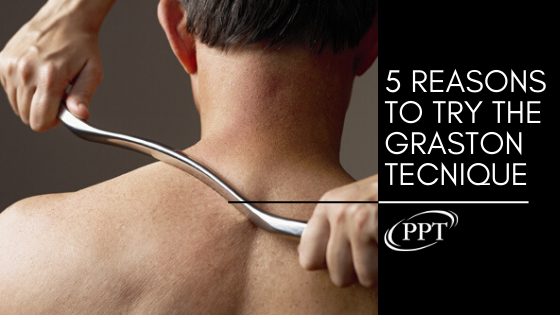5 Reasons to Try the Graston Technique
The Graston Technique is a patented form of manual therapy that uses stainless steel tools to find and release adhesions in the muscles; tight knots called trigger points and also scar tissue. Skilled clinicians certified in the technique use specially designed tools to locate knots by running the tools over the skin. They then use the same tools to break up and release the adhesions to reduce pain, increase your range of motion, and function. If your clinician has suggested you try the Graston Technique or you’re interested in knowing the benefits, here are five reasons you should try the Graston Technique for pain relief.
When it Works, it Works Quickly
The important thing patients should understand is that if Graston is going to work the results should happen quickly. Regardless of whether your injury is chronic or acute, you really should see significant results within 6-12 treatments. If you do not see results quickly, then it’s something that is not likely going to work for you and you need to re-evaluate.
It Decreases DOMS Related Muscle Pain
If you’ve ever had a particularly tough day at the gym, you’re probably familiar with delayed onset muscle soreness or DOMS. DOMS refers to the discomfort you feel in your muscles, starting about 24 to 48 hours after physical activity. It often lasts up to 72 hours after exercise. DOMS happens when the muscle performs an eccentric or lengthening contraction (i.e. running downhill or releasing weight from a bicep curl) resulting in micro tears. As the Graston Technique promotes the body to heal itself, it can also improve your range of motion and decrease the DOMS sensation making it a preferred treatment for many major sports teams.
It Activates Mechanoreceptors
The pressure used in the Graston Technique activates certain nerve fibers as well as the body’s sensory receptors including mechanoreceptors and proprioceptors. Together, these help you repair and strengthen muscles.
Reduces Pain & Improves Function
Studies conducted on the Graston Technique and other instrument-assisted soft tissue mobilization (IASTM) techniques show significant clinical improvements in pain reduction and function. That means that compared to more conservative treatments patients felt less pain and were able to move more! [1]
Treats Chronic Conditions
The Graston Technique can treat a variety of pain types both acute and chronic. It’s commonly used as part of a larger treatment plan to treat and manage conditions like Carpal Tunnel Syndrome, neck pain, Plantar Fasciitis, Rotator Cuff Tendinitis, Heel Pain /Achilles Tendinitis, DeQuervain’s Syndrome, surgical and traumatic scars, shin splints, IT band syndrome and many more conditions.
Are you interested in talking to a therapist trained in the Graston Technique? Book an appointment today with one of our skilled therapists to help determine if the Graston Technique could be a treatment option for you!

